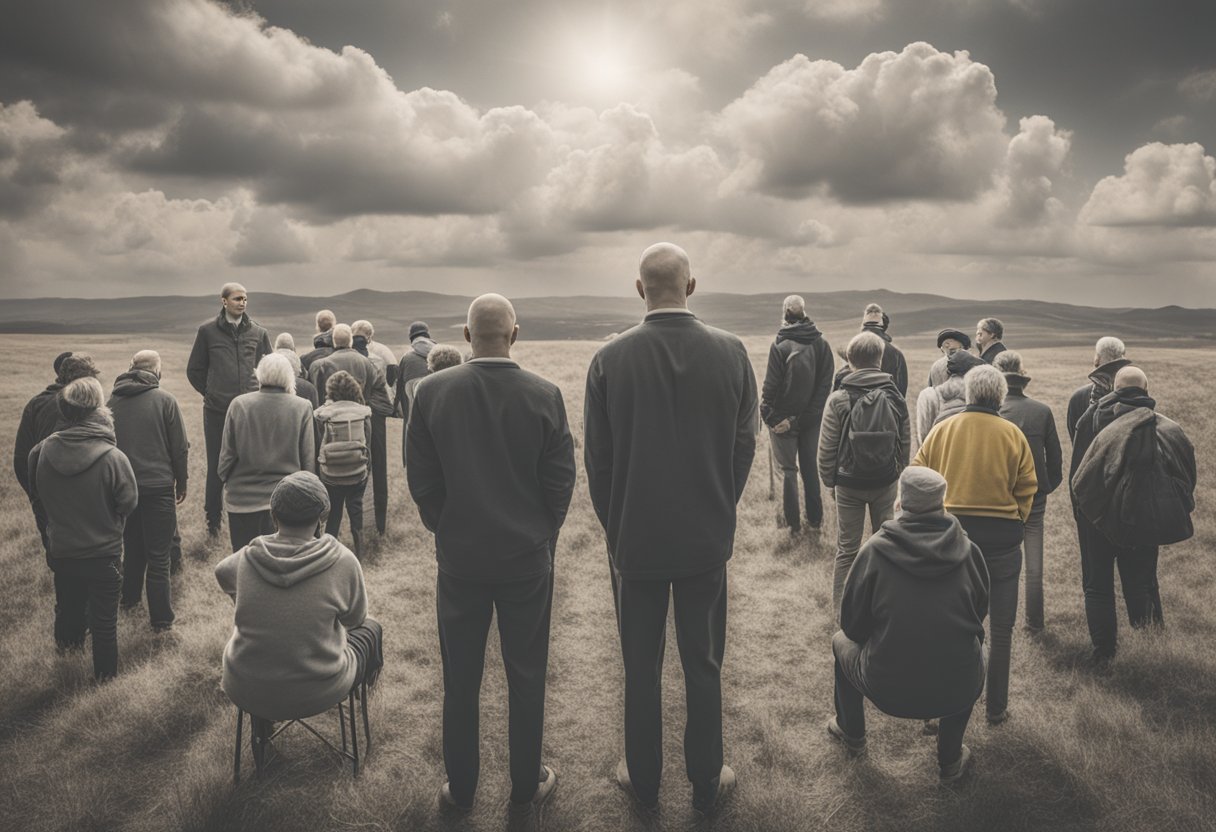Inspiring Journeys of Strength and Resilience
A cancer diagnosis can turn life upside down. I have survived lymphoma cancer twice, and I know firsthand how challenging the journey can be.
Uncovering a new purpose became a guiding light, helping me navigate the stormy seas of treatments and recovery. Through this process, I found renewed strength and focus.

For many men, battling cancer means confronting deeply personal questions about life, health, and the future. This journey becomes an opportunity to set new professional, personal, or health and well-being goals.
Committing to these goals can transform the fight against cancer into a journey of empowerment and growth.
Support from family, friends, and other survivors is crucial. They act as pillars of strength, offering encouragement and shared experiences.
Being part of a community where others understand the battle can provide hope and inspiration, making each step more manageable.
Key Takeaways
- Renewed purpose can guide cancer survivors during and after treatment.
- Setting new goals helps transform the cancer journey into empowerment.
- Support systems provide essential strength and encouragement.
Understanding Cancer

Cancer is a complex group of diseases characterized by uncontrolled cell growth. This section focuses on different types of cancer, how they are diagnosed, and what advanced cancer and metastasis mean.
Types of Cancer
Cancer can appear in many forms.
Blood cancer includes types like leukemia and lymphoma, affecting the blood, bone marrow, and lymphatic system.
Lymphoma targets the lymph nodes and lymphatic system. Meanwhile, mesothelioma is a rare cancer caused by asbestos exposure, affecting the lining of the lungs and other organs.
Each type has its own symptoms and treatment options. Understanding these differences helps in seeking appropriate care.
Cancer Diagnosis
Getting a cancer diagnosis is challenging. Doctors use various methods to identify cancer, including blood tests, imaging scans, and biopsies.
For instance, blood cancers like lymphoma are often detected through blood tests that reveal abnormal cells.
Early detection increases treatment success rates. My first lymphoma diagnosis was a turning point in my life, pushing me to seek proactive medical advice and subsequent treatment. Regular check-ups and screening are vital measures in catching cancer.
Advanced Cancer and Metastasis
Advanced cancer is often more aggressive and may spread or metastasize to other parts of the body. Metastasis is when cancer cells break away from the original tumor and form new tumors in other organs.
This stage is harder to treat and requires more intensive therapy. During my second battle with lymphoma, I encountered the challenge of metastasis. Yet, a dedicated treatment plan and the support of loved ones made a big difference in my recovery.
Advanced cancer usually involves more complex treatment plans, including chemotherapy, radiation, or targeted therapies, tailored to the cancer type and patient’s needs.
The Warrior’s Journey

A cancer diagnosis can be a catalyst for finding renewed purpose in life. Cancer survivors often embrace new roles, explore spirituality, or become advocates for causes close to their hearts.
Embracing the Warrior Identity
When I was diagnosed with lymphoma, I felt a surge of emotions. Accepting myself as a cancer warrior was a pivotal step.
It wasn’t just about fighting cancer; it was about finding strength and purpose in each day.
Becoming a warrior involves a mindset shift. I had to believe in my strength, even on tough days.
Wearing this identity helped me face treatments and lows with courage.
Accepting this role also connected me with a community. Seeing other men survive similar journeys brought me hope.
The camaraderie among cancer warriors is powerful. Shared experiences can uplift spirits and foster resilience. For many of us, embracing the warrior role is not just about surviving but thriving and finding new meaning in life.
Stories of Resilience
During my journey, I came across many resilient men. Each story carried lessons of hope and perseverance.
Take Jack, a fellow lymphoma survivor. He turned to meditation and art to cope. His story showed me the importance of creative expression in healing.
Another warrior, Tom, used his experience to become an advocate for early cancer screening.
Meanwhile, Mike, diagnosed with prostate cancer, found solace in sports. He started a local soccer team for cancer survivors. Playing together boosted their spirit and health.
These stories remind us that resilience isn’t huge leaps but small, consistent steps toward recovery and purpose.
Every cancer warrior’s tale is a testament to the human spirit’s power to overcome adversity.
Transitioning from Patient to Warrior
Transitioning from a cancer patient to a warrior is transformative. Initially, it involved daily battles with treatment and side effects.
I focused on physical health but also sought mental and emotional support.
Therapy and support groups were essential. They offered a safe space to share, vent, and find encouragement.
Becoming a warrior means redefining life goals post-recovery.
Many survivors, myself included, find new passions. Advocacy, volunteering, or pursuing long-forgotten dreams become part of our lives.
This transition is about more than just healing; it’s about harnessing the experience to create a life filled with purpose, strength, and resilience.
Purpose and Positivity

A cancer diagnosis can spark a renewed purpose in life. Many men find energy and hope in embracing their values and passions, whether spiritual or action-oriented.
Finding Purpose in the Fight
When I faced lymphoma cancer twice, finding a fresh sense of purpose became essential. The diagnosis pushed me to pursue goals that align with my values and experiences.
Men often find volunteering or advocacy work helps channel their energy positively.
They dedicate themselves to causes that resonate with their journey.
This new purpose can provide a powerful focus in the emotional battle against cancer.
Engaging in meaningful activities boosts our psychological resilience, and we remain motivated throughout treatment and recovery.
The Power of Positivity
Maintaining a positive outlook during cancer is not about ignoring the pain. It’s about finding reasons to hope and move forward.
For me, the power of positivity came from connecting with supportive peers and loved ones. Their encouragement lifted my spirits.
Simple practices like mindfulness and gratitude exercises made a difference, helping me focus on the good despite challenges.
In my experience, surrounding oneself with positive influences creates a nurturing environment that fosters healing.
Sharing stories with fellow survivors can also be uplifting, reminding us that we are not alone in this fight.
Positive Mindset and Healing
A positive mindset significantly influences the healing process. Research shows that people with a hopeful attitude can experience better health outcomes.
My journey underscored that positivity isn’t just an emotion but a mental habit.
Embracing this mindset can impact physical recovery.
Guided imagery, meditation, and setting small, achievable goals helped me stay grounded and focused.
By visualizing success and remaining hopeful, I felt more in control and ready to tackle each day.
Encouraging men to adopt a positive outlook empowers them to face cancer from a place of strength and determination.
Support Systems

A strong support system plays a critical role in a man’s journey through cancer treatment and recovery.
Support can make a significant difference from family involvement to community resources and professional guidance.
Role of Family and Loved Ones
Family and loved ones are the cornerstone of support for men battling cancer.
During my cancer journey, the daily presence of my spouse and children provided emotional balance and motivation. Simple acts of sitting with me during chemotherapy or sharing meals made me feel less isolated.
Loved ones can also help manage practical tasks.
This might include coordinating medical appointments, preparing nutrition-heavy meals, and helping with household chores.
These actions allow patients to focus on recovery without worrying about day-to-day responsibilities.
Communication is key.
I found that openly sharing my fears and progress with my family reduced anxiety all around. They also learned how to support me better, creating a circle of mutual understanding and care.
Finding Community Support
Connecting with others who share similar experiences can be deeply reassuring.
I joined a local cancer support group, which became an invaluable resource.
These groups provide an opportunity to share stories and gain insight into coping strategies from other survivors.
In addition to local groups, online forums, and social media platforms offer spaces where individuals can connect regardless of location.
Participating in these communities helped me feel understood and less alone in my battle.
Community events, like fundraising walks or awareness seminars, also foster a sense of contributing to something bigger.
These activities allowed me to channel my energy positively, giving me a renewed sense of purpose.
I also recommend checking out resources like those the American Cancer Society offers.
Guidance of Qualified Health Professionals
Professional guidance is essential for navigating the complex medical landscape of cancer treatment. My oncologist played a pivotal role in outlining treatment options and side effects. Regular consultations helped me understand my progress and adjust my treatment plan as needed.
Mental health professionals provide another layer of support. Individual counseling helped me process the emotional toll of my diagnosis. Counselors can teach coping mechanisms and stress management techniques tailored to individual needs. You can learn more about these services from reputable resources like the American Cancer Society.
Nutritionists and physical therapists also offer specialized advice that supports overall health during and after treatment. Their expertise helped me maintain energy levels and manage treatment side effects more effectively.
Fostering a comprehensive support system that includes family, community, and professional guidance can create a more manageable and hopeful path through cancer.
Treatment and Recovery

Facing cancer means navigating a challenging journey that demands strength, resilience, and hope. It’s a path filled with diverse treatments, alternative therapies, and the goal of reaching remission.
Navigating Cancer Treatment
When I began my cancer treatment, the path ahead felt overwhelming. Treatment varied depending on the type and stage of cancer. My regimen included chemotherapy and radiation. Chemotherapy, with its rigorous schedule, aimed to destroy cancer cells, while radiation focused on reducing tumor size.
The support from my healthcare team was vital. Regular consultations helped me adjust treatments based on how my body responded. By maintaining open communication with doctors, I stayed informed and aware of my progress.
Critical Steps in Navigating Treatment:
- Choosing the right healthcare team
- Understanding treatment options
- Maintaining consistent follow-ups
Therapies and Healing Practices
Beyond conventional treatments, I explored various therapies and healing practices. Integrative therapies like acupuncture and yoga played a significant role in my recovery. Acupuncture helped manage pain and reduce treatment side effects, while yoga improved my mental well-being and physical strength.
Nutritional counseling also guided me to adopt a diet that supported recovery. Lean proteins, fresh vegetables, and healthy fats became staples. Meditation helped keep my spirit high and promoted peace during stressful times.
Recommended Healing Practices:
- Acupuncture for pain management
- Yoga for physical and mental health
- Nutritional counseling for a balanced diet
- Meditation for stress relief
Remission and No Evidence of Disease
Achieving remission and hearing “No Evidence of Disease” (NED) were monumental milestones. It marked the end of active treatment and a new beginning. Regular scans and tests monitored my status, ensuring no hidden cancer cells remained.
Living in remission requires vigilance. I maintain a healthy lifestyle, stay active, and eat well. Frequent check-ups with my oncologist are part of my routine to catch any changes early.
- Regular medical check-ups
- Healthy lifestyle practices
- Staying informed on new research
- Active participation in support groups
Inspiration and Impact
Facing cancer reshaped my outlook on life. Through meeting incredible people and sharing my story, I found new ways to inspire hope and make a positive impact.
Inspirational Figures
During my cancer journey, I met remarkable individuals who faced adversity with grace. Mike Sea, another cancer survivor, fueled my will to keep fighting. Terry Tucker’s dedication to raising awareness inspired me to become more active in cancer-related causes. These relationships provided me with support and motivation.
Cancer warriors often find strength in those who walk a similar path. Witnessing others’ resilience helps reinforce your belief in survival and recovery. Each person’s unique story contributes to a shared sense of hope and determination.
Contribution through Speaking Engagements
Sharing my experience through speaking engagements had a profound effect on me. I spoke at hospitals, schools, and cancer support groups to inspire others facing similar battles. These engagements allowed me to connect deeply with people and share the lessons I learned during my journey.
When discussing my experiences, I aimed to offer hope and practical advice. Seeing the impact of my story on others was incredibly rewarding. It also helped me heal by turning my pain into a source of encouragement for others.
Legacy and Memories
I wanted to create a legacy to help future cancer warriors find hope and strength. To this end, I organized events and fundraisers to support cancer research and patient care. These initiatives helped channel my energy into actions that made a real difference.
Creating memories with loved ones also became a priority. I focused on small, meaningful moments that brought joy and comfort. This approach reminded me that life’s value lies in cherished interactions and shared experiences. These memories offer a lasting source of strength for me and my family.
Living Beyond Cancer
Living beyond cancer often means finding renewed purpose, embracing change, and giving back to the community. It’s about turning challenges into opportunities for growth and connection.
Embracing Survivorship
Survivorship can feel overwhelming. There are physical and emotional hurdles that must be faced daily.
Focusing on hope and faith helped me navigate these challenges. Getting active and following a healthy lifestyle became crucial to my journey. Exercise isn’t just about physical health; it also boosts mental well-being. Connecting with friends, family, and support groups kept me rooted and motivated.
Survivorship involves honoring the battle fought and striving to make each day meaningful.
Thriving with a Changed Identity
Cancer changes a person’s identity. I found my priorities shifted. What once seemed vital became less so as I focused on what mattered. This experience taught me to cherish each moment and live authentically.
I embraced my new identity by finding new hobbies and setting fresh goals. I poured energy into areas of interest that aligned with my values. This transformation was like a second chance at living a fulfilling life. Accepting my scars and celebrating my achievements made me stronger and more resilient.
Studies suggest that many cancer survivors undergo profound personal growth, finding deeper meaning in life and forming stronger relationships.
Advocacy and Education
Advocacy became an essential part of my journey. Sharing my experiences with others helped educate those facing similar battles. I found that speaking out could offer hope and guidance to fellow thrivers.
I participated in research projects, sharing my story for educational purposes. This helped me further understand cancer and provided a sense of empowerment. Participating in community outreach and speaking at events allowed me to connect with others and foster a supportive network.
Being an advocate means promoting awareness, supporting research, and helping educate others on how to cope with and thrive after cancer.
The Debate
As a man who has survived lymphoma twice, I understand the mixed feelings around labels like “warrior” and “fighter.” Some men find these terms empowering. They frame their battle with cancer in terms of strength and resilience, drawing parallels with sports strategies and training regimens.
Yet, others feel differently. Using terms like “warrior” can sometimes imply that those who don’t survive didn’t fight hard enough. This notion is not only misleading but also damaging. Men facing aggressive cancers like glioblastoma often face significant challenges despite their efforts.
Perspectives on Purpose
- Survivor: Many men identify as survivors. This label emphasizes enduring hardship and coming out stronger on the other side.
- Thriver: Others prefer to call themselves thrivers, focusing on living life fully after diagnosis. They seek new goals and passions.
- Fighter: The fighter mentality connects deeply with sports culture, emphasizing mental toughness and physical endurance.
Impact on Mental Health
The choice of labels can significantly affect mental well-being. Those who embrace terms like “thriver” may find optimism and motivation. Others who reject combative terminology may prefer gentler and more holistic approaches.
Society’s Role
Society often pushes certain narratives. While well-meaning, these can sometimes minimize the complexities faced by each individual. Everyone’s journey is unique.
For more insights on why using warrior metaphors can have implications, see “It doesn’t take a warrior to beat cancer.”
Final Thoughts
Being a cancer warrior teaches you more about life than you ever imagined.
When I faced lymphoma twice, my world was turned upside down.
Each battle changed me in ways that provided greater clarity and purpose.
Many men find that their experiences with cancer drive them to set new goals.
Some dive into spirituality or faith, seeking deeper connections and understanding.
Others dedicate themselves to causes that resonate with their journey and values.
Finding Purpose After Cancer:
- Set New Goals: Use your experience to define what truly matters.
- Explore Spirituality: Seek comfort and strength in faith or meditation.
- Support Others: Offer guidance and companionship to those on a similar path.
It’s normal to feel lost sometimes, but channel that energy into something productive.
Tips for Staying Positive:
- Stay Active: Engage in sports or physical activities.
- Join a Group: Connect with other survivors for support and friendship.
- Help Out: Volunteer for cancer charities or awareness events.
Reflect on your journey and see the strength within you.
By focusing on these areas, you can turn your experiences into pillars of strength that help you and inspire and uplift others.
Remember, it’s not about the battle but how you rise after each fight.
Let’s stand together, more vital than ever.
Frequently Asked Questions
Dealing with cancer, especially as a man, can pose unique challenges. These answers aim to guide and support from initial diagnosis to post-treatment life.
What Are the First Steps to Take After a Male Cancer Diagnosis?
The first steps after a cancer diagnosis involve understanding the type and stage of cancer. Consulting with specialists and seeking second opinions can be beneficial. Engaging with a cancer care team helps in outlining a clear treatment plan.
How Can Cancer Warriors Maintain a Positive Outlook During Treatment?
Maintaining a positive outlook involves setting small, achievable goals. Participating in support groups and connecting with other survivors can provide emotional strength, and focusing on daily victories can uplift spirits.
What Lifestyle Changes Support Healing and Well-being for Men with Cancer?
Incorporating a balanced diet and regular physical activity has proven beneficial. Mindfulness practices, such as meditation or yoga, can reduce stress. Staying hydrated and getting sufficient sleep also support overall well-being.
What Are the Key Elements of a Support System for Male Cancer Patients?
A robust support system includes family, friends, healthcare providers, and support groups. Open communication and emotional availability can help create a supportive environment. Sometimes, professional counseling can also play a vital role.
How Can Men Find Meaning and Purpose During Cancer Recovery?
During recovery, men might explore new hobbies or volunteer opportunities. Reflecting on life goals and possibly realigning them with new perspectives can be transformative. Spirituality and mindfulness practices may also offer renewed purpose.
What Resources Are Available for Male Cancer Survivors Seeking to Rebuild Their Lives?
Many organizations offer resources like job retraining programs and financial planning assistance.
Peer support groups and counseling services can provide emotional support.
Access to information on long-term health management strategies is also available.
Choosing the right resources can significantly impact rebuilding and enriching life post-recovery.
